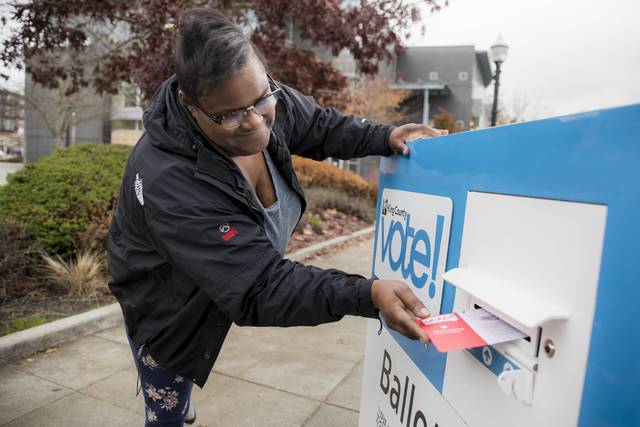SEATTLE — Washington state voters have passed measures tightening gun regulations and making it easier to prosecute police for negligent shootings passed.
But an initiative that would charge the nation’s first tax on carbon emissions to tackle climate change trailed in early returns Tuesday in the state’s costliest initiative campaign.
The fight over whether to make polluters pay for their carbon emissions was closely watched nationwide. Experts said Initiative 1631 would show that states can take climate action even if the Trump administration doesn’t, and create momentum for other states.
Voters roundly rejected a carbon tax two years ago. But a broad coalition of environmental, community, labor and other groups tried again with a new pollution charge — technically levied as a fee — and a spending plan to steer revenues toward projects aimed at reducing greenhouse gas emissions.
“We know we’re in a hole,” said Nick Abraham, a spokesman for the carbon-fee supporters said late Tuesday. The initiative was losing 44 percent to 56 percent. “Regardless whether we win or lose, this problem isn’t going anywhere.”
The opposition campaign sponsored by the Western States Petroleum Association, an oil industry group, outspent carbon-fee supporters by roughly 2-to-1. The No on 1631 campaign spent about $30 million, or twice the $15 million supporters spent.
Dana Bieber, a spokeswoman with that campaign, declared victory Tuesday night for “working families, consumers, small businesses and family farmers.”
In other ballot measures, a measure tightening state gun laws including enhanced background checks for people buying semi-automatic rifles won. Initiative 1639 had 60 percent of the vote.
“Washington state made history by passing the most comprehensive gun violence prevention measure in state history,” Stephen Paolini, campaign manager for Yes On 1639, said in a statement.
The measure would also increase the minimum age to buy semi-automatic rifles from 18 to 21, add a waiting period to get those weapons and add firearm storage provisions.
Voters approved a measure designed to make it easier to prosecute police for negligent shootings. Initiative 940 is designed to improve police training in de-escalation tactics and eliminate a requirement that prosecutors prove officers acted with malice to get a conviction in negligent shootings.
A measure backed by the beverage industry that would block local governments from taxing soda and other groceries had a solid lead in early returns. Initiative 1634 would prohibit local governments from imposing new taxes on soda or grocery items and was part of an effort by the industry to stop the expansion of taxes on soda and other sweetened beverages.
The election was marked by big industry spending on major statewide initiatives with oil companies breaking state spending records to try to defeat the proposed carbon pollution fee.
Opponents flooded mailboxes and ran TV ads warning of increased gasoline and energy costs while proponents, who included Seattle rapper Macklemore and the actor Leonardo DiCaprio, urged voters to support clean energy and other projects.
The beverage industry targeted Washington state as part of a nationwide effort to stop the expansion of taxes on soda.
A campaign sponsored by the American Beverage Association spent more than $20 million on Initiative 1634, which would block local governments from imposing new taxes on soda or grocery items. The industry earlier won bans on new, local soda taxes in California, Arizona and Michigan.
The Coca-Cola Co., PepsiCo, Inc. and Dr. Pepper Snapple Group, Inc. gave the bulk of money in support. Opponents raised about $33,000.
Under the measure, cities and counties in Washington would be prohibited from taxing soda or food products. The measure wouldn’t prevent the state Legislature from doing so. Seattle’s tax on soda and sugary beverages, approved last year, would remain in effect but couldn’t be expanded.
Proponents said the tax hurts small businesses and working people. Opponents said it prevents local governments from raising money and allows corporate interests to create state policy.
Meanwhile, the National Rifle Association and some law enforcement groups lined up against the gun measure, Initiative 1639.
Opponents said the measure strips the constitutional rights of 18- to 20-year-olds and that forcing gun owners to lock away their firearms could put them in danger.
Supporters said the goal is to curb gun violence and make schools and communities safer by putting safeguards in place. They say making the checks as thorough as the one used for buying a pistol will help ensure that weapons are kept out of dangerous hands.
Initiative 940 is designed to improve police training in de-escalation tactics and eliminate a requirement that prosecutors prove officers acted with malice to get a conviction in negligent shootings.
The initiative’s sponsor, De-Escalate Washington submitted I-940 to the Legislature early this year after collecting nearly 360,000 signatures. Lawmakers passed I-940 and a compromise version of the legislation preferred by lawmakers, activists and police groups. The state Supreme Court ruled that I-940 in its original form would go on the November ballot while the compromise would not.
Initiative sponsors have said they are focused on getting the measure passed and expect to work with police groups and others on compromise language.
After voters rejected a carbon tax in 2016 and lawmakers failed to pass carbon tax legislation earlier this year, a coalition of environmental, community and tribal group collected thousands of signatures to put a carbon fee measure on the ballot.
Under the measure, large polluters such as fuel producers and natural gas plants would pay an escalating fee on fossil fuels used or sold in the state or electricity generated within the state, starting at $15 per metric ton in 2020.
An estimated $2.3 billion raised in the first five years would fund a wide range of programs aimed at cutting greenhouse gas emissions.
Proponents found financial backing from environmental groups, tech leaders, Microsoft’s co-founder Bill Gates and former New York City Mayor Michael Bloomberg.
———
For AP’s complete coverage of the U.S. midterm elections: http://apne.ws/APPolitics


